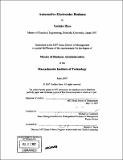Automotive electronics business
Author(s)
Hase, Yoshiko, M.B.A. Massachusetts Institute of Technology
DownloadFull printable version (4.627Mb)
Other Contributors
Sloan School of Management.
Advisor
Michael A. Cusumano.
Terms of use
Metadata
Show full item recordAbstract
In the automotive industry, due to the trend to introduce active safety systems, concerns about protecting the environment, and advances in information technology, key automotive manufacturers are eager to acquire new enabling technologies which can provide solutions for these issues. As a result, the demand for automotive electronics is increasing. Meanwhile, due to strict requirements for demanding specifications, as well as low volume commitment offered by car manufacturers as compared with consumer electronics products, many electronics manufacturers have so far avoided entering this business. However, as the requirement for high technology grow, the technology of the electronics companies becomes indispensable for the car manufacturers. Currently, there are some electronics companies who provide automotive parts, mostly on the components level and not on the solution level, but only few of them are truly successful. The automotive electronics business requires various types of components as well as demanding specifications for safety and operating conditions. Offering solutions for this demanding industry often requires cross-organizational initiative. (cont.) Despite the difficult challenges, many electronics companies, including semiconductor and fabless companies, have already penetrated into this industry, and its market is becoming more and more competitive. The purpose of this work is to discuss the potential of Toshiba Corporation to become a major player in the automotive electronics industry. While it seems to be attractive, there are also many challenges which would face Toshiba as a new player attempting to penetrate this market. The work will focus on the understanding and analysis of these challenges. The work will start from a general description of the current automotive electronics industry. Following, I will discuss the future technological trends of automotive electronic systems and the demands and requirements of the different geographical markets. Following this general background, Toshiba's current market position and a comparison to the key competitors is presented. The work will be concluded with a discussion of the optional strategies which can be adopted by Toshiba if it decides to focus on the automotive market.
Description
Thesis (M.B.A.)--Massachusetts Institute of Technology, Sloan School of Management, 2007. Includes bibliographical references (leaf 96).
Date issued
2007Department
Sloan School of ManagementPublisher
Massachusetts Institute of Technology
Keywords
Sloan School of Management.